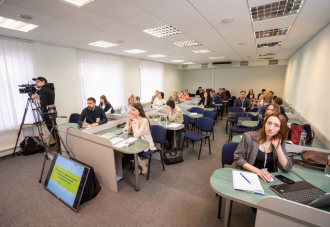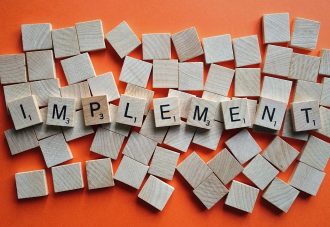VULYK Union of Active Women, which participates in the Mentorship Program 3.0, has been helping displaced people in Poltava since 2015, since representatives of the organization themselves were forced to get evacuated from their hometowns.
After February 24, the work intensified: union member pick up and, if possible, accommodate people, help them get humanitarian aid, and also try to psychologically help people who have been evacuated from the zone of active hostilities.
“There are six of us left, and we are just a drop in the ocean,” says Nataliia Dida, an art therapist and chair of the Union. In addition to her main activities in the organization, Ms. Nataliia is also a Red Cross volunteer and a Free Legal Aid volunteer.
In addition to her main activities in the organization, Ms. Nataliia is also a Red Cross volunteer and a Free Legal Aid volunteer. “We have people of various professions, majors, areas, people with whom we have been in touch all these years.” It is through this community that evacuees get Union contacts.
“We have different facilities,” says Nataliia Dida. “There’s a student dormitory where one works and lives, people are housed there. There is also a facility at school. There is a private kindergarten, which also accommodates up to 30 people. All others, like my family, accommodate those who are passing through at home. They stay for a few days, a week or a more. Then they either find an apartment or move abroad”.
In addition to assistance with accommodation, VULYK union of active women provides full support to the displaced people it accommodates:
- Consultations and assistance to those who register as IDPs: Where to register, where to get humanitarian aid, what to get from the Red Cross, what can be received from other funds;
- Information and assistance for those traveling abroad: how to travel further, where to go, where to safely stay on the road.
“We meet, accommodate, take them to places where they can get dressed, tell them where they can get stuff, food kits, hygiene products, anything people need. With us, everything is simple, but clear. We have been living in this situation for 8 years, so we understand people very well,” says Ms. Nataliia.
Three tips for organizations and volunteers accommodating IDPs
Nataliia Dida and representatives of VULYK Union of Active Women know from their own experience what it is like to be displaced, and what it is like to solve IDPs’ problems.
Ms. Nataliia told what is important to pay attention to if your organization did not deal with IDPs until February 24, 2022.
- Consider the psychological component.
According to Nataliia Dida, one must understand that people can behave inappropriately, be prepared for this.
“The last family that stayed with us for a week and a half – they were afraid to go outside. Even though they came, everything was there, we take them in for free. People were simply afraid to leave the house.”
According to Ms. Nataliia, you should not try to “mend” the displaced people, pry into their life, but it is important to understand that people can behave inappropriately because they have experienced something that should not have been experienced.
- Don’t try to solve all the problems of the people you’re helping for them.
It is a negative practice when volunteers or IDP hosts try to do everything for them, because a person can get used to this. This may have negative consequences in the future.
Ms. Nataliia says that she and her colleagues monitored the situation in dormitories and schools where IDPs are accommodated: “One school housed people and everything was done for them there. In a different school, they have shift work. Yes, food or products were brought to them, they were given the opportunity to do everything themselves. People arranged some kind of shift work themselves. Same situation, different result. And you can feel the difference in attitude and well-being of the internally displaced people.”
- We should try to engage people in volunteering.
We are talking about the importance of IDPs becoming involved in helping others.
“It’s such a powerful medicine,” says Nataliia Dida. “I know this from my own experience, and I can see it in other people.” People get distracted, they get into another reality.”
According to Ms. Nataliia, people should be engaged in what they can do, because there is a lot of work now: sort out clothes in warehouses, hold workshops, etc.
After humanitarian aid – psychological support
“Humanitarian aid is one thing. But after that, something different begins: People change a lot emotionally because of what they experienced,” says Nataliia Dida.
In 2014, Ms. Nataliia came to Poltava with her child, and did not know what to do. She had no money to enroll her child in an extracurricular activity, and study groups were full in October-November. “We started the workshops intuitively, the UNHCR provided us with the opportunity to study and complete two art therapy courses,” says Ms. Nataliia.
“And now, according to unofficial data, there are as much as about 150,000 displaced people in Poltava Region. Just imagine: there is hardly breathing space in Poltava. Where do we take children? Where can adults go?”
As an art therapist, Nataliia Dida holds several workshops and art therapy meetings almost every day.
VULYK Union of Active Women holds meetings in an open space, in a spacious hall. So people can see that something is going on, they get interested. In the beginning, the organization engaged professionals: artists, craftsmen and craftswomen. Now some people want to be participants, and some want to act as craftsmen and craftswomen.
“When you hold a workshop, you forget about everything. And people who come, both adults and children, they also ‘switch’. We have helped so many families in these 8 years. That’s why we keep doing it.”
There are a lot of people who want to do it: Should the organization put up a pre-registration form – up to 80 people register in just an hour. However, there is a lack of arts and crafts supplies.
“It’s neither psychology nor art. This is free creativity,” says Ms. Nataliia.
According to her, people sometimes do not realize what they themselves have in them; that they can not only sit and grieve, but also do something beautiful and useful.
“It is very important that if a person comes with nothing, even simple household items can be made. At one time, we made many household items for ourselves. And this aspect is also important – craftsmanship.“
Nataliia Dida believes: You don’t have to love what you do, but you have to do what you love – then you will get results. “If a person does something with the best intentions, then they will find a way to help people, they will understand, even if they have not been in a similar situation. And even more so we were in a similar situation.”
Events in Poltava that IDPs can join now
- “+Emotions” project from the VULYK School of Useful Leisure –https://www.facebook.com/groups/vulik;
- Leisure activities for families affected by war –https://www.facebook.com/groups/1540078889669792/posts/1699155157095497/.
Mentorship Program 3.0 is being implemented as part of the Project Ukraine Civil Society Sectoral Support Activity implemented by the Initiative Center to Support Social Action “Ednannia” in partnership with the Ukrainian Center for Independent Political Research (UCIPR) and Centre for Democracy and Rule of Law (CEDEM).



